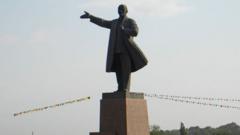In a press conference held in London on Monday, NATO Secretary-General Mark Rutte addressed the need for member nations to increase their defense budgets significantly, citing the ongoing threats posed by Russia and the changing dynamics of international military support.
NATO Chief Calls for Dramatic Increase in Defense Spending Amid Rising Tensions

NATO Chief Calls for Dramatic Increase in Defense Spending Amid Rising Tensions
NATO Secretary-General Mark Rutte urges alliance members to commit to 5% military spending in response to Russian aggression.
On June 9, 2025, Rutte outlined his call for a "quantum leap in our collective defense," emphasizing that spending should soar beyond the commitments currently made by the UK and most other member states. He proposed that NATO countries invest 5% of their Gross Domestic Product (GDP) into military and defense programs—an ambitious goal that echoes former President Trump's critique of the alliance’s reliance on U.S. funding.
The suggestion aims to be solidified during the upcoming NATO summit scheduled in The Hague on June 24-25. Yet, Rutte has not defined a specific timeline for when countries would need to reach this lofty spending target.
Britain has already pledged to boost military spending to 2.5% of GDP by 2027 by reallocating funds from foreign aid. Meanwhile, Prime Minister Keir Starmer has set a longer-term aspiration of 3% within the next decade but lacks a precise date due to uncertainty about funding sources.
Analysts warn that meeting the 5% target would require Britain to make significant and potentially unpopular fiscal adjustments, particularly given its current defense spending stands at 2.3%—higher than that of France and Germany but lower than the United States, which spends approximately 3.4%.
Rutte's call to arms serves as a stark reminder of the shifting landscape in global defense, and the potential challenges NATO members will face as they navigate their military budgets amid financial constraints.
The suggestion aims to be solidified during the upcoming NATO summit scheduled in The Hague on June 24-25. Yet, Rutte has not defined a specific timeline for when countries would need to reach this lofty spending target.
Britain has already pledged to boost military spending to 2.5% of GDP by 2027 by reallocating funds from foreign aid. Meanwhile, Prime Minister Keir Starmer has set a longer-term aspiration of 3% within the next decade but lacks a precise date due to uncertainty about funding sources.
Analysts warn that meeting the 5% target would require Britain to make significant and potentially unpopular fiscal adjustments, particularly given its current defense spending stands at 2.3%—higher than that of France and Germany but lower than the United States, which spends approximately 3.4%.
Rutte's call to arms serves as a stark reminder of the shifting landscape in global defense, and the potential challenges NATO members will face as they navigate their military budgets amid financial constraints.





















